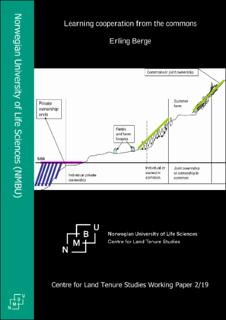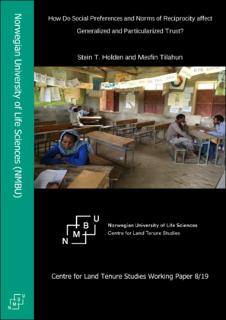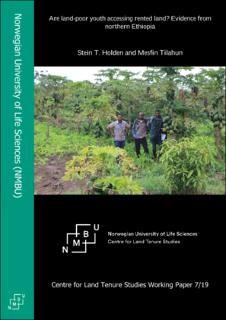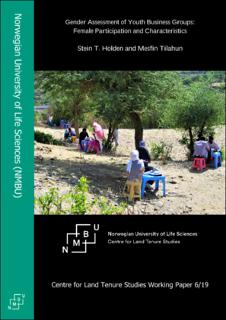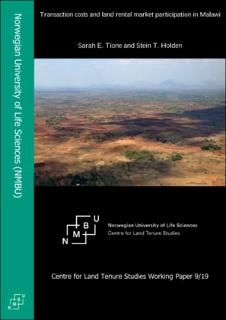Location
The Centre for Land Tenure Studies was opened at the Nowegian University of Life Sciences (NMBU) on the 27th of June 2011 resulting from a joint initiative by researchers at the Department of International Environment and Development (Noragric), the School of Economics and Business, and the Department of Landscape Architecture and Spatial Planning. In 2012 was joined by the Department of Ecology and Natural Resource Management.
Mission
The Centre for Land Tenure Studies (CLTS) at NMBU is established to further the study of land tenure. Land tenure studies define a broad and complex field of study cutting across many disciplines. For CLTS this entails, but is not limited to, the following activities:
- Provide a common arena for discussing land tenure issues, including a series of seminars directed to present new research or important theoretical perspectives. This may be designed as part of an educational program.
- Promulgate a joint series of working papers.
- Support international publication of articles and books.
- Develop and conduct joint courses at both Master and PhD level.
- Initiate and support exchange of researchers.
- Participate in research networks related to land tenure.
- Maintain a public list of collaborating institutions and researchers.
- Initiate and develop applications for research funds to support basic research on land tenure both by our own efforts and in collaboration with other research groups working on land tenure questions.
In its activities the centre will use English as its working language as far as practically possible. In short we may say that the mission of the Centre for Land Tenure studies is to enhance collaboration across departments at NMBU; to strengthen the visibility of NMBU activities within the field of land tenure; to strengthen NMBU’s international collaboration and networks within the field; to contribute to research and knowledge generation on land tenure issues; to help build capacity in the South and in Norway within the field; to disseminate policy lessons, and to contribute to policy debates.
Resources
Displaying 11 - 15 of 67Learning cooperation from the commons
The paper discusses the link between commons as they might have been used in
prehistoric Norway and the rules concerning the exploitation of the commons as
found in the oldest known legislation for regions of Norway, Gulating Law and
Frostating Law. One clear social dilemma has been identified: the setting of a
common date for moving animals from the home fields up to the summer farms
and home again in the fall. The problem was obvious and the solution not
particularly difficult to institute. Many more problems were of course present,
How do social preferences and norms of reciprocity affect generalized and particularized trust?
We study how social preferences and norms of reciprocity are related to generalized and particularized trust among members of youth business groups in northern Ethiopia. Members of these groups are recruited among land-poor rural youth. The Ethiopian government promotes youth employment among land-poor rural youth by allocating them rehabilitated communal lands for the formation of sustainable businesses. The groups are organized as primary cooperatives, elect their own board, make their own bylaw and prepare a business plan that has to be accepted by the local government.
Are land-poor youth accessing rented land? : evidence from northern Ethiopia
Continued strong population growth in already densely populated rural areas in parts of Sub-Saharan Africa makes it harder for youth to choose agriculture as their main source of income. We investigate whether near landless youth still can access rented land as a complementary source of income. We utilize a unique data of rural youth that have been allocated rehabilitated communal land to form formalized business groups for joint business activity. They rely on complementary sources of income and land renting is one of these.
Gender assessment of youth business groups : female participation and characteristics
This working paper is an output from the research project “Youth Business Groups for Sustainable Development: Lessons from the Ethiopian Model” that is funded by Research Council of Norway under the NORGLOBAL2 research program for the period 2019-2022. This working paper provides updated and extended information on the gender differences among group members and how these are related to likelihood of becoming group board members and leaders.
Transaction costs and land rental market participation in Malawi
We assess the extent of access and degree of participation by smallholder tenants in the land rental market in Malawi. Our study is based on three rounds of nationally representative Living Standards Measurement Surveys collected in 2010, 2013 and 2016, from which we construct a balanced panel. We apply the transaction cost theory, which suggests transaction costs to be non-linear and depend on resource as well as socioeconomic characteristics within the customary tenure system that determines who hold, use and transfer land.








